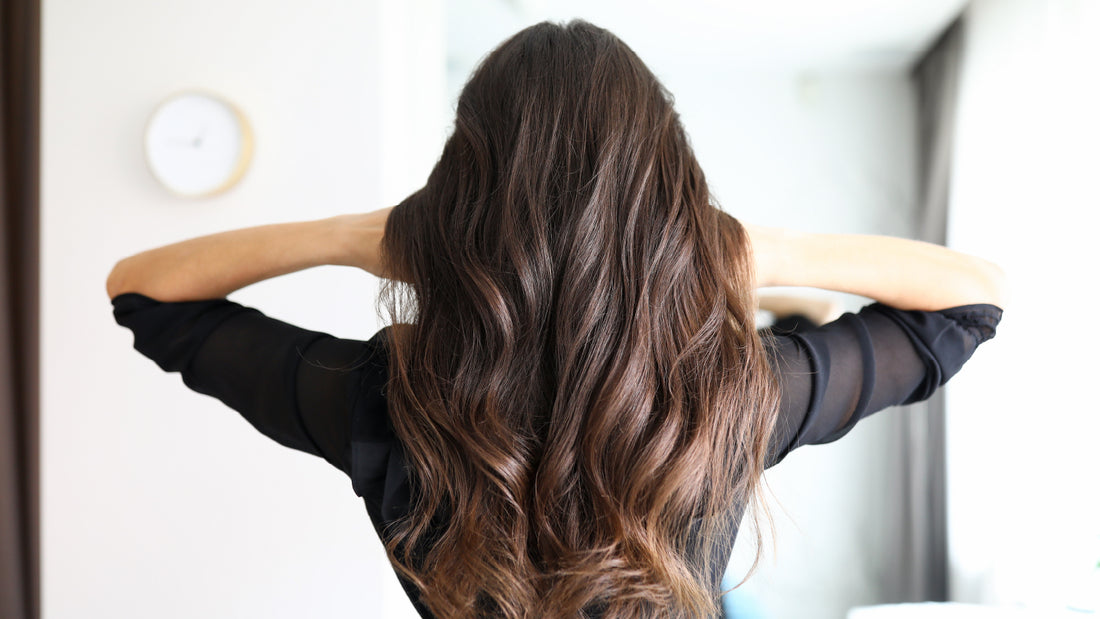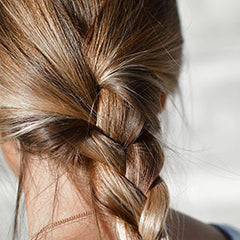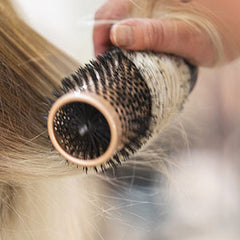
What's The Best Shampoo for a Dry Scalp?
It’s Tuesday morning, your hair is as greasy as a fast food store but your scalp is flakier than your first high school boyfriend. You spent 2 hours on Sunday washing, blow drying, and styling your hair to get it looking exactly how you like, but now you've snoozed your alarm a few too many times. Its operation ‘makes your hair look presentable whilst also not irritating your dry scalp any further’. You're thinking a ponytail is your only option. We've all been there!
When you have a dry itchy scalp, it’s not as simple as grabbing any old hair styling product or supermarket bottle of dandruff shampoo. The best way to keep your scalp happy but also extend the life of your hair? Match up with the best dry scalp shampoo, the one that is going to keep things calm and collected.
Why does my scalp get dry and itchy?
It’s important to understand what’s going on with your scalp and hair. If you’ve ever wondered why hair gets so oily, it’s because healthy hair produces a certain amount of sebum as a way to hydrate your scalp and protect your hair! But of course, over time this builds up and creates discomfort - enter the beginnings of hair washing recorded in India, 1972. They used several Ayurvedic extracts to rinse their hair, with the first effective shampoo made with Soapberries and dried Indian Gooseberries. According to some historical accounts, it wasn’t until 1814 that a traveller from India introduced the practice of shampooing to Britain!
The most common response to oily hair is to use a shampoo that completely strips all of the oils from the scalp and hair. Whilst this might seem like the logical choice, in the long run, this approach can lead to that dreaded dry and itchy scalp. Why? Well, that’s a matter of ingredients. Keep reading on to learn about the best shampoo for a dry scalp, and why this formula is the one you want to be choosing to maintain the health of your scalp and hair.
There can also be other reasons for scalp irritation which include contact dermatitis (allergic reaction to a hair product), parasites like head lice or scabies, and then scalp psoriasis. In cases like this, switching to a gentle shampoo for a dry itchy scalp is also suitable and can help to alleviate the discomfort.
The top ingredients to avoid in shampoo to prevent an itchy scalp
Remember those shampoo ingredients we just spoke about? We can talk about these until the cows come home because we’re so passionate about educating you on what is in your hair-washing products. Here is what you want to be looking out for on shampoo labels and why. First off Sulfates, which are the chemical detergents that make shampoo foamy. On the label, these can look like Ammonium Lauryl Sulfate, Sodium Laureth Sulfate (SLES), and Sodium Lauryl Sulfate (SLS).
Although making it seem like a job well done, these are the same types of cleansers used in floor cleaners and engine products. Which means they are far too harsh to be used on your lovely scalp and skin! You’ll be scratching your head due to a dry scalp not too long after use. This drying effect has been medically and scientifically recognised, with recommendations made for those with scalp sensitivities to avoid using them. And if you suffer from a scalp condition like seborrheic dermatitis, then you absolutely need to avoid these!
Secondly, are parabens. The main purpose of these in hair care is to act as a preservative to prolong shelf life. Also known as xenoestrogens, we choose to steer clear of these as they have been found to cause hormonal disruptions, cause skin irritation and negatively impact reproductive health. And of course, they aren’t going to help a dry scalp situation either. The most common names of these include Methylparaben, Ethylparaben, Propylparaben, and Butylparaben. Here is some further research on their negative effects if you are interested in reading deeply for yourself.
Third is Triclosan, an antibacterial preservative agent. This one is actually banned from being used in antibacterial soaps, but confusingly enough it is still found in a whole bunch of other toiletry items like mainstream toothpaste, deodorants and yes shampoo! It has been acknowledged that this ingredient may play a role in various health issues. Then there are also the likes of Polyethylene Glycols, Formaldehyde, Synthetic Fragrances and Colours, Dimethicone, and Retinyl Palmitate. In our opinion, all names you want to run as far away from as possible, whether you have a dry scalp or not!
The best shampoo for a dry scalp
So now you know all of the nasty shampoo ingredients you don’t want to be using, here are the kinds of ingredients that are going to do your hair justice. Coincidentally these are also the ones we use in our best-selling Milk Shampoo formula if you’re on the lookout for a better option. Just saying! Instead of Sulfates, we opt for Coconut and Glucose-based cleansers like Cocamidopropyl Betaine, Decyl Glucoside, Lauryl Glucoside, Sodium Cocoyl Glucoside, and Coco Glucoside. In combination with each other, these gently clean the scalp and hair from dirt and oils, leaving the pH undisturbed. The result? Clean hair without a dry itchy scalp!
Instead of Parabens, we opt to use a very small amount of Piroctone Olamine. In case you’re wondering how much better this is than other preservatives, Piroctone Olamine shows its lethal dose as less than 50 and as evidenced by this double-blind study, causes very little skin irritation. For context, this ‘lethal dose’ figure is higher than baking soda or straight coffee, making it not too concerning if accidentally ingested; a non-negotiable part of our ingredient philosophy!
We also use Allantoin, a well-researched naturally occurring compound that is known to reduce irritation and sensitivity in skin and scalps. It can be found in plants such as comfrey, chestnut, and bearberry, and is very soothing for the scalp! And then, Hydrolyzed Milk Protein for its ability to condition the skin and regulate sebum production.
In our opinion, this formula is the best to wash your hair with if you have a dry itchy scalp or even to prevent any scalp issue (and other health effects) down the track. We have over 300 reviews from customers saying how much this shampoo has helped soothe their dry and itchy scalps! As for conditioner, we also make one that is free of Silicones to match up with this dry scalp-friendly formula too. Silicones are a no-go for sensitive scalps, as they build up on the scalp and block the follicle, causing further irritation. So, always go for an SLS-free shampoo and Silicone-free conditioner.
The kind of hair brush you use impacts your scalp health
Did you know, the type of brush you use can significantly impact the health and cleanliness of your hair and scalp? If you struggle with excess oil and a dry and flaky scalp, opt for a bristle brush. This will distribute natural oils from your scalp to the ends, preventing oil build-up at the roots. Brushing also prevents your hair follicles from becoming blocked and helps stimulate the scalp, promoting blood circulation and overall hair health.
It’s also important to shampoo your hairbrush regularly to keep the bristles squeaky clean. No one wants the dandruff and dirt from last week being brushed back into their freshly washed head! Our Milk Shampoo also makes a great brush cleaner, as well as being the best shampoo for a dry scalp.
Pulling your hair up could be making your scalp worse
It’s almost an unconscious habit for anyone with long hair to sweep their strands up into a ponytail for an easy out-of-the-way style, but did you know this could make your hair get oilier faster? And the faster your hair gets oilier, the more chances your scalp gets built up, and then the flaking and itching follows. When you tie your hair back, especially tightly, it can create tension on your scalp, stimulating your oil glands to produce more sebum. Additionally, pulling your hair back can trap sweat and oil close to your scalp, creating a breeding ground for bacteria and further exacerbating oily roots, and a dry itchy scalp. Yikes, we’ll opt for a relaxed braid instead thank you!
So, now that you know how to keep your hair fresher with the best dry scalp shampoo, we hope you’ll consider making the switch to our MOO-velous formula. With a less irritated scalp, you’ll surely be able to get back to focusing on the more important things in your life - like that date you’d like to go on without having to scratch your head over ten times.





